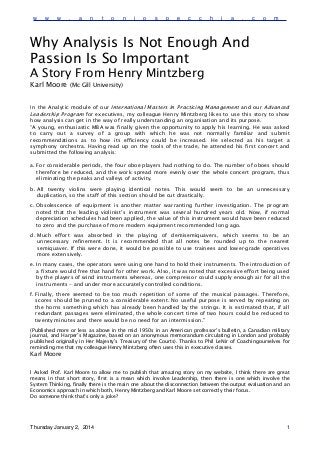
240KarlMoore-Why.analysis.is.not.enough
- 1. w w w . a n t o n i o s p e c c h i a . c o m Why Analysis Is Not Enough And Passion Is So Important A Story From Henry Mintzberg Karl Moore (Mc Gill University) In the Analytic module of our International Masters In Practicing Management and our Advanced Leadership Program for executives, my colleague Henry Mintzberg likes to use this story to show how analysis can get in the way of really understanding an organisation and its purpose. “A young, enthusiastic MBA was finally given the opportunity to apply his learning. He was asked to carry out a survey of a group with which he was not normally familiar and submit recommendations as to how its efficiency could be increased. He selected as his target a symphony orchestra. Having read up on the tools of the trade, he attended his first concert and submitted the following analysis: a. For considerable periods, the four oboe players had nothing to do. The number of oboes should therefore be reduced, and the work spread more evenly over the whole concert program, thus eliminating the peaks and valleys of activity. b. All twenty violins were playing identical notes. This would seem to be an unnecessary duplication, so the staff of this section should be cut drastically. c. Obsolescence of equipment is another matter warranting further investigation. The program noted that the leading violinist’s instrument was several hundred years old. Now, if normal depreciation schedules had been applied, the value of this instrument would have been reduced to zero and the purchase of more modern equipment recommended long ago. d. Much effort was absorbed in the playing of demisemiquavers, which seems to be an unnecessary refinement. It is recommended that all notes be rounded up to the nearest semiquaver. If this were done, it would be possible to use trainees and lower-grade operatives more extensively. e. In many cases, the operators were using one hand to hold their instruments. The introduction of a fixture would free that hand for other work. Also, it was noted that excessive effort being used by the players of wind instruments whereas, one compressor could supply enough air for all the instruments – and under more accurately controlled conditions. f. Finally, there seemed to be too much repetition of some of the musical passages. Therefore, scores should be pruned to a considerable extent. No useful purpose is served by repeating on the horns something which has already been handled by the strings. It is estimated that, if all redundant passages were eliminated, the whole concert time of two hours could be reduced to twenty minutes and there would be no need for an intermission.” (Published more or less as above in the mid 1950s in an American professor’s bulletin, a Canadian military journal, and Harper’s Magazine, based on an anonymous memorandum circulating in London and probably published originally in Her Majesty’s Treasury of the Courts). Thanks to Phil LeNir of Coachingourselves for reminding me that my colleague Henry Mintzberg often uses this in executive classes. Karl Moore I Asked Prof. Karl Moore to allow me to publish that amazing story on my website, I think there are great means in that short story, first is a mean which involve Leadership, then there is one which involve the System Thinking, finally there is the main one about the disconnection between the output evaluation and an Economics approach in which both, Henry Mintzberg and Karl Moore set correctly their focus. Do someone think that’s only a joke? Thursday January 2, 2014 1
